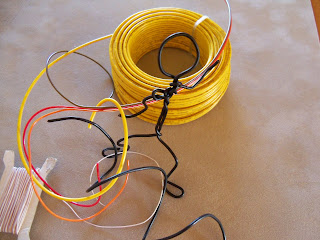Sunday, February 13, 2011
Scale Model Wire Choices
Round Wire and Flat Wire (Conductive Tape) are staples in scale model wiring. They are used independently and in combination to create successful wiring systems for hobby scale projects.
Conductive Threads, products of the e-textile movement, have stretched the scope of possibilities for hobby wiring design, just as light emitting diodes (LEDs) have. Conductive threads will be covered in more detail in a later post.
Round Wire Safety
It’s better to use wire that’s a little too large rather than a little too small. Wire heats up while conducting electricity. Wire that’s too small for the electrical load heats up faster and gets hotter than wire that is the right gauge. Hot wire and combustible material are a bad combination.
I’ve seen the smoldering results of overheated dollhouse gauge wire in a scale model wood structure. The smoke was an interesting effect but the fire scare was not. The wire was the right gauge for the project as originally planned but was not adequate for later modifications.
Play it safe. Wire that is slightly larger than needed conducts electricity just as efficiently while staying cooler. The increased effort for hiding or camouflaging the wire is minimal (if any) and you gain the flexibility to safely add lights and electric gizmos later.
Round Wire Gauge FYI
The larger the gauge, the smaller the number.
Commonly available dollhouse wire is 32 gauge.
The difference in diameter between 32 gauge and 28 gauge is less than 5/100s of an inch. Resistance is the source of heat production in wire.
The resistivity of 32 gauge wire is more than twice that of 28 gauge wire.
Round Wire Sizes and Guide
Gauge Diameter (inches) Resistivity (Ohms/Km)
32 0.0080 538
31 0.0089 426
30 0.0100 338
29 0.0113 268
28 0.0126 212
27 0.0142 169
26 0.0159 134
25 0.0179 106
24 0.0201 84
Flat Wire /Conductive Tape
Flat Wire or Conductive Tape is flattened copper wire (approx. 5/100” thick x 3/8” wide) fixed on an adhesive tape. This allows for surface installation that can be hidden under surface coverings.
Fixtures and lights can be easily installed at anytime anywhere along the course of the tape run.
Conductive Threads, products of the e-textile movement, have stretched the scope of possibilities for hobby wiring design, just as light emitting diodes (LEDs) have. Conductive threads will be covered in more detail in a later post.
Round Wire Safety
It’s better to use wire that’s a little too large rather than a little too small. Wire heats up while conducting electricity. Wire that’s too small for the electrical load heats up faster and gets hotter than wire that is the right gauge. Hot wire and combustible material are a bad combination.
I’ve seen the smoldering results of overheated dollhouse gauge wire in a scale model wood structure. The smoke was an interesting effect but the fire scare was not. The wire was the right gauge for the project as originally planned but was not adequate for later modifications.
Play it safe. Wire that is slightly larger than needed conducts electricity just as efficiently while staying cooler. The increased effort for hiding or camouflaging the wire is minimal (if any) and you gain the flexibility to safely add lights and electric gizmos later.
Round Wire Gauge FYI
The larger the gauge, the smaller the number.
Commonly available dollhouse wire is 32 gauge.
The difference in diameter between 32 gauge and 28 gauge is less than 5/100s of an inch. Resistance is the source of heat production in wire.
The resistivity of 32 gauge wire is more than twice that of 28 gauge wire.
Round Wire Sizes and Guide
Gauge Diameter (inches) Resistivity (Ohms/Km)
32 0.0080 538
31 0.0089 426
30 0.0100 338
29 0.0113 268
28 0.0126 212
27 0.0142 169
26 0.0159 134
25 0.0179 106
24 0.0201 84
Flat Wire /Conductive Tape
Flat Wire or Conductive Tape is flattened copper wire (approx. 5/100” thick x 3/8” wide) fixed on an adhesive tape. This allows for surface installation that can be hidden under surface coverings.
Fixtures and lights can be easily installed at anytime anywhere along the course of the tape run.
Subscribe to:
Post Comments (Atom)

0 comments:
Post a Comment